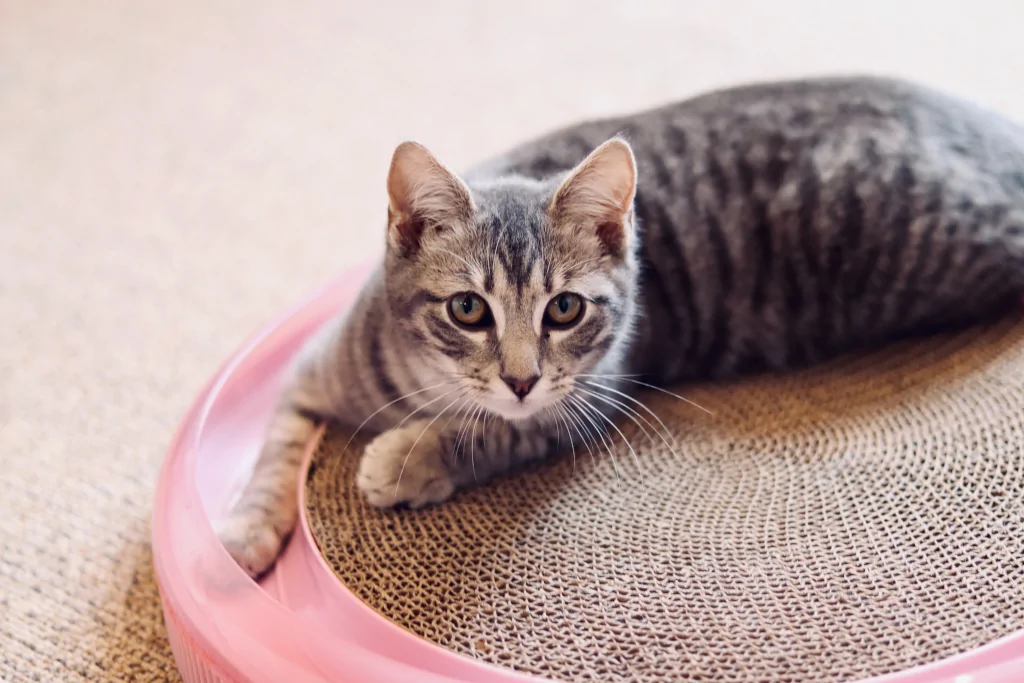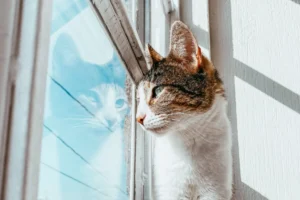Disclosure: We may earn a commission from helpful, relevant links in our content. No cost to you. See our privacy policy.
Are you puzzled by your cat’s pee lacking its usual distinct smell? It might make you wonder if there’s something going on with your feline friend’s health. Cat urine usually has a noticeable odor, but if it doesn’t, it could be a sign of something else.
In this post, we’ll delve into the possible reasons for odorless cat urine and how to ensure your cat’s urinary health stays in tip-top shape.

Why Does My Cat’s Pee Not Smell Normal?
Cats typically have urine with a strong, ammonia-like odor, which can vary in intensity.
When your cat’s pee doesn’t smell normal, it might be due to increased water consumption, leading to diluted urine with a weaker smell. This could result from a change in diet, hot weather, or simply your cat drinking more water than usual.
However, it’s essential to consider other factors that could cause odorless urine. Sometimes, it could indicate an underlying health issue, such as kidney problems or diabetes.
It’s crucial to keep an eye on your cat’s urinary habits and overall health, as we’ll discuss in the upcoming sections of this blog post.
What Could Clear, Odorless Urine Indicate?
Increased Water Intake
As mentioned earlier, clear, odorless urine might simply result from your cat consuming more water than usual. This can dilute the urine, making it appear clear and reducing its smell. Keep track of your cat’s water intake and note any changes that coincide with the odorless urine.
Kidney Problems
If your cat’s urine remains clear and odorless despite normal water intake, it could indicate kidney problems.
The kidneys play a vital role in filtering waste and maintaining proper hydration. When they’re not functioning correctly, the urine might become diluted, leading to a weaker smell. If you suspect kidney issues, consult your veterinarian.
Diabetes
Another potential cause of odorless cat urine is diabetes. Increased thirst and urination are common symptoms of this condition.
If you notice other signs like increased appetite, weight loss, or lethargy, it’s essential to seek veterinary advice.
How to Monitor Your Cat’s Urinary Health
Observe Your Cat’s Behavior
Keep an eye on your cat’s behavior, especially when they use the litter box. Note any changes in frequency, straining, or vocalizing during urination, which could signal a problem.
Inspect the Litter Box
Regularly inspect your cat’s litter box for changes in urine color, consistency, and odor. By doing this, you’ll be more likely to notice any abnormalities early on.
Measure Water Intake
Monitor your cat’s water consumption, as changes in intake could affect their urinary health. If you notice a significant increase or decrease, consult your veterinarian.
Provide Fresh Water and Clean Litter
Ensure your cat always has access to fresh water and a clean litter box. This will help prevent urinary tract infections and encourage healthy urinary habits.
Regular Vet Check-ups
Schedule regular veterinary check-ups to catch potential urinary issues early. Your vet can perform tests and offer guidance on maintaining your cat’s urinary health.
If you’ve never taken your cat to the vet, it’s essential to pick a good one. Follow this guide to choose the right vet for your cat.
When Should I Consult a Veterinarian?
It’s essential to consult a veterinarian if you notice any sudden changes in your cat’s urinary habits, such as straining, increased frequency, or blood in the urine.
Additionally, if your cat displays symptoms like lethargy, vomiting, or excessive drinking and urination, it’s crucial to seek professional advice to address potential health concerns.
Tips for Keeping Your Home Smelling Fresh
Here are a few tips to have your home smelling fresh despite your cats or litter boxes:
- Clean the litter box regularly. Scoop waste daily and replace the litter entirely once a week to keep odors at bay.
- Use odor-absorbing litter. Opt for cat litter that neutralizes odors, such as activated charcoal or baking soda-infused products.
- Place litter boxes strategically. Position litter boxes in well-ventilated areas, away from heating vents or humid spaces to reduce odor buildup. If living in highly humid areas, follow our guide for the best cat litter for humidity, or get a powerful dehumidifier like this one.
- Air purifiers and deodorizers. Use air purifiers or deodorizing sprays designed for pet odors to keep your home smelling fresh.
FAQs
What is the normal color and odor of cat urine?
Cat urine is typically light yellow to amber in color and has a distinct, somewhat pungent odor.
How can I tell if my cat is dehydrated?
To check for dehydration, gently pinch your cat’s skin between your fingers; if it doesn’t return to its normal position quickly, your cat may be dehydrated. Other signs include sunken eyes, lethargy, and dry gums.
Can a change in diet affect my cat’s urine?
Yes, a change in diet can affect your cat’s urine due to differences in nutrient content, hydration levels, and ingredients that can impact urine odor and concentration. For example, foods high in asparagus or fish can change urine odor, while increased water intake can result in lighter-colored and less-concentrated urine.
Strong-smelling urine can be associated with dehydration, urinary tract infections, or certain metabolic diseases. Consult your veterinarian if you’re concerned about your cat’s urine odor.
Alex, a passionate animal lover, has experience in training and understanding animal behavior. As a proud pet parent to two dogs and three cats, he founded AnimalReport.net to share insights from animal experts and expand his knowledge of the animal kingdom.





Good post! We will be linking to this particularly great post on our site. Keep up the great writing